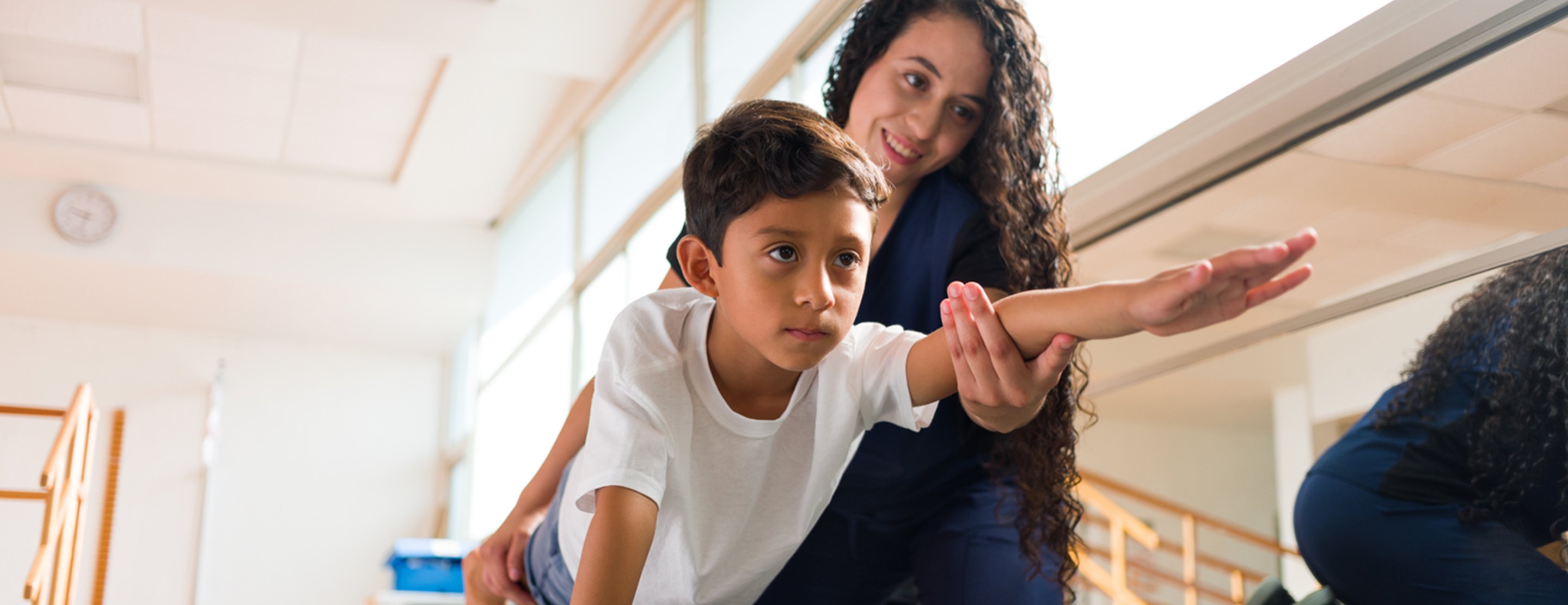
Pediatric Amplified Pain Rehabilitation (PAPR) Program
UCSF's Pediatric Amplified Pain Rehabilitation (PAPR) Program is an intensive program in the hospital for children with severe amplified pain syndrome. While our long-term treatment goal is pain relief, our immediate goal is to help our patients regain functions lost due to pain. For example, the goal could be walking without crutches, returning to school or participating in sports again. We also teach effective strategies for managing stress and improving general wellness.
The PAPR team includes doctors, physical and occupational therapists, creative arts therapists, child life specialists, social workers, integrative medicine specialists, schoolteachers and a psychologist. Our doctors and our physical and occupational therapists have specialized training in rehabilitation for amplified pain.
Our locations (1)
After discharge
Kids continue to use their regained functions and new coping skills at home. Most of them keep seeing their mental health providers at clinic visits but don’t need to continue rehabilitative therapy.
It’s in this second phase – usually one to six months after discharge – that pain improves significantly and often goes away completely.
Pain rehabilitation vs. traditional rehabilitation
Most outpatient clinics are not equipped to treat severe amplified pain, because traditional rehabilitative methods aim to avoid pain during exercise. This makes sense when someone is recovering from surgery or an injury, but the goal for patients with amplified pain is the opposite: They need to work through their pain during rehabilitation.
Our PAPR team is specially trained to support children as they exercise through pain. We use desensitization techniques – in which a light touch stimulates painful areas – to retrain pain-sensing nerves to function normally.
This is done safely, under the close supervision of physical and occupational therapists, and in a compassionate way that minimizes emotional distress. Most of these sessions are one-on-one.
Assessment for the PAPR program
Kids may be candidates for the program if their condition hasn’t responded to outpatient therapy or if severe disability necessitates intensive therapy. Other criteria include acceptance of the amplified pain diagnosis and willingness to exercise through pain and participate in talk therapy.
As part of an initial assessment, specialists evaluate children’s readiness for admission and communicate with their mental health care providers. Once admission is scheduled, our hospital schoolteacher communicates with their school to create a lesson plan.
Children can participate even if they have other medical issues, such as joint hypermobility or bone fragility. Those are taken into consideration when we develop a personalized treatment plan.
How the program works
Our goal is empowering children to regain function and learn strategies for managing stress. We provide a safe, comfortable space where patients can focus on working toward recovery.
We don’t offer medications for amplified pain, and most patients are weaned off pain medication before admission. The average stay is three to four weeks.
A variety of PAPR providers care for patients over the course of their stay:
- On admission, our physical and occupational therapists evaluate your child to develop an individualized program. A typical day consists of two to three hours of physical therapy and two to three hours of occupational therapy.
- Patients meet with our psychologist three times a week to address psychological factors associated with chronic pain and for help with the emotional stresses of pain rehabilitation. Our psychologist also works with parents while their kids complete the program.
- Art and music therapists work with patients to promote healthy ways to cope with stress. Creative arts therapy can help them explore their feelings, help them develop social skills, reduce anxiety, and boost self-esteem.
- Child life specialists support general development and adjustment in the hospital setting. Their work with patients may include strengthening social skills and peer relationships; identifying outlets for expression; or training in biofeedback for pain management, with the support of the psychologist.
- Our integrative medicine specialists offer alternative treatments, such as acupressure. They teach techniques to reduce pain and anxiety that kids can use on their own.
- Our doctor and nurse practitioner teams include a pediatric hospitalist (a specialist in the care of hospitalized patients), physical medicine and rehabilitation doctors, and providers from the Pediatric Pain, Palliative & Integrative Medicine Center.
- Our schoolteacher looks out for kids in the program by requesting ahead of time that the patient’s school keep assignments to a minimum, as the program’s schedule doesn’t allow much time for schoolwork. Most important, our schoolteacher coordinates the transition back to school as part of discharge planning, so children can catch up with minimal stress.
We hold weekly team meetings to assess each child's progress. Patients are ready for discharge when they have met their goals and the care team is confident they’ll maintain function and can successfully transition back to home and school.
Therapeutic day passes
On weekends, the PAPR team may give a seven-hour therapeutic day pass to patients who have completed the week's therapies successfully and can safely leave the hospital without staff supervision.
These passes are an important part of the program. Spending time outside of the hospital with family gives children the opportunity to practice new skills in their home environment and supports their emotional health. It also builds confidence for both the patient and their family when the time comes for discharge, helping ensure a good transition home.
After discharge
To make sure they’re doing well, patients return to the Pediatric Pain Management Clinic one month after discharge. They also have at least one or two more follow-up visits over the next six months to check that they’re maintaining physical function and managing stress well. We recommend that children continue to see their counselors or psychotherapists after discharge.
Patients who successfully complete the PAPR Program will have the skills necessary to manage any future flare-ups of amplified pain, benefiting their physical as well as emotional well-being.
Awards & recognition
-

Ranked among the nation's best in 11 specialties
Support services
Fetal surgery firsts
The first open fetal surgery in the world was performed at UCSF in the early 1980s.
















































